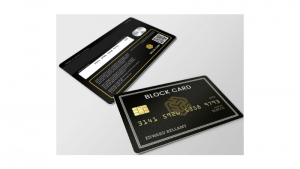
“Ternio’s goal is to accelerate the use of blockchain and cryptocurrency into everyday life,” said Ian Kane, COO & Founder of Ternio. “BlockCard enables the card holder to gain real utility from their cryptocurrency and removes the notion that crypto is only a speculative asset. Ternio’s goal is to accelerate the use of blockchain and cryptocurrency into everyday life. BlockCard enables the card holder to gain real utility from their cryptocurrency and removes the notion that crypto is only a speculative asset.”

BlockCard
BlockCard currently supports four cryptocurrencies – Bitcoin (BTC), Ethereum (ETH), Stellar Lumens (XLM) and Ternio (TERN). Consumers who hold any of those cryptocurrencies can deposit them into their BlockCard account (after signing up). Ternio indicates it will add additional currencies.
Those who sign up for BlockCard have the option to select between a virtual or physical card. Those who select a physical BlockCard can choose between plastic or metal versions.
Ternio claims BlockCard is “one of only three approved crypto debit cards in the United States” – and the first to support multiple cryptocurrencies, which offers card holders (if they own different cryptocurrencies) the option on how to fund their BlockCards. Ternio suggests BlockCard is the only card which enables real time spending of cryptocurrency by processing transactions via a crypto exchange.
Daniel Gouldman, CEO and Founder of Ternio said: “We want to give consumers the option on which digital asset they use to fund their BlockCard account, Card holders decide if they want to buy a bagel with their Bitcoin or a latte with their Stellar Lumens. Most importantly, these transactions occur on digital asset exchanges, which helps to propel the crypto community.”
Ternio and Lexicon
Ternio is a blockchain company seeking to drive the adoption of blockchain and cryptocurrency into everyday life. This has two components:
- BlockCard (described above)
- Lexicon.
The reality Ternio describes is that no one blockchain can hold all of the world’s data and be fully decentralised. This is unlikely to change: trillions of data-points and terabytes of data per second present problems which do not suggest a feasible or reliable solution is imminent.
For example, many different blockchain frameworks exist. Each serves a different purpose and/or use-case. Furthermore, no single blockchain has demonstrated a significant amount of transactions per second in any industry (though there are plenty of claims for this).
To address this Ternio is creating Lexicon as a scalable blockchain able to meet the needs of any multiple possible scenarios and use-cases. In Ternio’s vision, Lexicon will enable a decentralised, simple to setup blockchain flexible enough to be used across a wide variety of industries and their use-cases, including the following contrasts:
- advertising: (high transaction rate, with large data sets)
- credit/debit transactions (high transaction rate, with small data sets)
- government (low transaction rates, with large data sets)
- insurance: (low transaction rates, with small data sets).
Lexicon is or will not be open-source. It is a proprietary blockchain built by Ternio where:
- there will be patent submissions for the Lexicon architecture
- the consensus algorithm uses custom asynchronous BFT (Byzantine Fault Tolerance)
- the Ternio framework combines the Lexicon blockchain (the data protocol) and the Stellar Blockchain (payment protocol).
Lexicon was originally a fork off of Hyperledger Fabric. Ternio says Lexicon handles high transactions rates with relatively low latency.
Enterprise Times: what does this mean
BlockCard, as Ternio notes, is not the first to issue crypto debit cards. It is also not the first to support multiple cryptocurrencies (though it may be the first in the US). Alternatives elsewhere include Wirex, Cryptopay or Uquid.
To complicate matters, on January 5, 2018 (sic), CoinTelegraph reported that Visa suspended the activity of WaveCrest, the company then then providing most crypto cards. out there. This meant that Xape, Wirex, TenX, Bitwala and CryptoPay either suspended their services or now work only in specific countries.
The two bigger points to register, however, are:
- crypto debit (or credit) cards represent another potential ‘engagement’ of cryptocurrencies into normal life
- Lexicon looks like an interesting blockchain for enterprises to monitor.



























[…] Read more Here | 2019-01-08 06:45:00 Image credit: source var td_screen_width = window.innerWidth; if ( […]